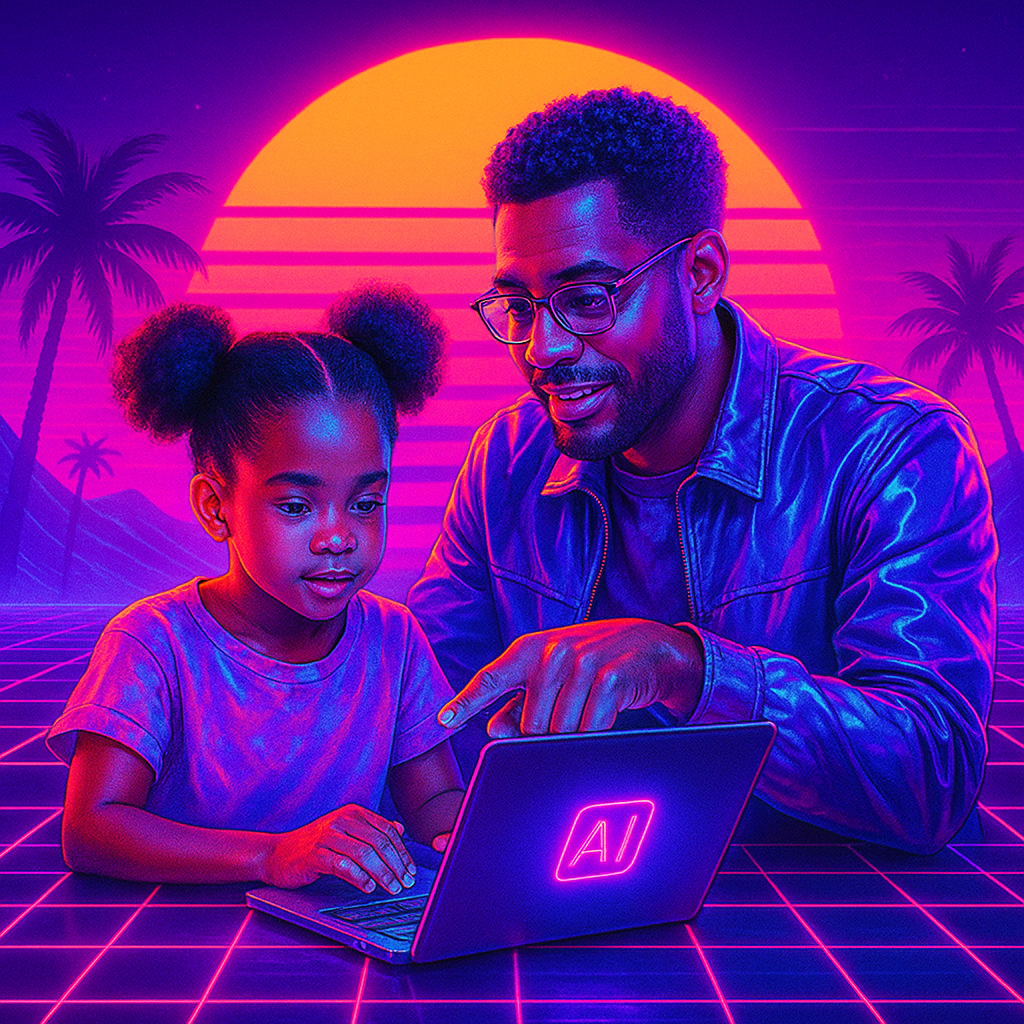An Engineer's Blueprint for AI Abundance

A few weeks ago, the abstract debate about our AI-powered future became starkly real. Marc Andreessen, the influential venture capitalist behind "Techno-Optimist Manifesto," is backing Super PACs with hundreds of millions of dollars to shape American policy in the upcoming midterm elections. This isn't just a donation; it's a down payment on a specific version of the future. It’s an attempt to write the source code for our nation’s next operating system. As I see AI being infused into society, it seems only a select few organizations are positioned to reap the benefits, which will only exacerbate the wealth-inequality gap.
This observation brings back a voice from thirty years ago. Some of my earliest memories are of waking up and hearing music, and one voice that always stood out was Tupac Shakur’s. In a 1992 interview, Tupac highlighted the moral dichotomy of our modern world with a simple, profound statement: "Even if you earned it, you still owe"
Today, as AI capabilities accelerate toward Artificial General Intelligence (AGI), we stand on the cusp of what many, including Google DeepMind co-founder Demis Hassabis, call "Radical Abundance". Hassabis’s vision of a world where AI solves humanity's biggest problems and ushers in a world of radical abundance could become reality. But Tupac's moral challenge remains: abundance for whom? This leads to a central problem: How do we engineer a future of radical abundance that can withstand the zero-sum instinct in human nature?
The Techno-Optimist Promise
The techno-optimist worldview, championed by figures like Hassabis and Andreessen, rests on a compelling historical precedent: technology expands the pie, creating new value rather than just redistributing existing wealth. The internet created entirely new industries, and each wave of innovation has ultimately lifted global living standards.
Their vision for AI-driven abundance is grand. AlphaFold has revolutionized biology by solving protein structures in minutes rather than years. The trajectory is clear: AI is tackling intractable problems, and automation could deliver tenfold productivity gains across every industry. The argument is that this abundance will naturally distribute itself through market mechanisms, creating new jobs and lowering costs for everyone. From this perspective, the best way to help the poor isn't redistribution but innovation that makes everything cheaper and more accessible.
The Moral Challenge
But Tupac's 1992 critique cuts through optimistic assumptions about automatic distribution. His insight wasn't about the technical possibility of abundance—it was about the moral failure of allowing concentration amid plenty.
The numbers today make Tupac's point even more starkly. Global wealth has exploded over the past three decades, yet extreme inequality persists. OpenAI CEO Sam Altman projects the rise of one to ten person billion dollar businesses, which will exacerbate these inequalities. Will this new wealth automatically "trickle down"? History suggests it will pool instead.
This reveals the zero-sum game hardwired into human nature—behaviors that made sense in scarcity but become destructive in abundance. These include status competition, hoarding instincts, and the winner-take-all dynamics of network effects. When a resource becomes abundant, controlling access to it becomes the new form of scarcity. This is why tech’s promises of democratization often become platforms for concentration. Social media was supposed to give everyone a voice, which eventually led to new digital monopolies. The pattern repeats: abundance gets created, then captured. For example, Wikipedia created knowledge abundance by designing systems that reward contribution over ownership, while social media platforms started open but became walled gardens as they grew.
The Engineering Challenge
Both techno-optimists and their critics often assume the distribution of AI's value will either happen automatically through markets or be impossible to fix. But what if distribution is an engineering problem that requires intentional design? When we design complex systems, we don’t just optimize for performance; we design for reliability, fault tolerance, and graceful degradation. We anticipate failure modes and engineer around them. We can apply the same principles to our economic systems to ensure the benefits of AI are distributed fairly. As an engineer, I believe we can’t just hope for a better outcome; we have to design for it. Here is a three-part blueprint for what that could look like.
Keep the Power Decentralized
The first principle is simple: don't let anyone have a monopoly on the future. Right now, the power to build cutting-edge AI is held by a handful of giant corporations.
- The Analogy: Imagine if only three companies in the world were allowed to own printing presses. They would have total control over which books, ideas, and news the public could read. A future with centralized AI is no different.
- The Solution: We need to foster a diverse ecosystem. This means supporting open-source AI models that anyone can use and build upon. It also means investing in public resources, like a national system of supercomputers, that give universities, startups, and smaller players a chance to compete and innovate. It ensures the tools of the future belong to everyone.
Establish Rules for a Fair Game
The promise of abundance is meaningless if its rewards aren't accessible. The internet has a set of rules (protocols) that ensures an email sent from a basement in Ohio can reach a CEO in Tokyo. We need to create similar, universally understood rules for our new economy.
- The Analogy: Think about the board game Monopoly. One of its most basic rules is "Pass Go, Collect $200." It’s a simple, automatic mechanism that gives every player recurring capital to stay in the game. What if our economy had similar, built-in rules?
- The "New Rules":
- A "Data Dividend" is one such rule. Our collective data is the fuel for today’s AI. A dividend would be a small payment to every citizen for the value created from that shared resource—like a digital "Pass Go, Collect $200."
- Another rule is ensuring access to opportunity, like building public libraries or parks. Public access to AI tools and training would be the modern equivalent, ensuring everyone has the resources to learn, create, and participate.
Make the Rulebook Public and Adaptable
Every fair game needs a rulebook that all the players can read and agree on. The ethical rules that govern our AI-driven society shouldn't be hidden in corporate source code or changed by lobbyists in secret.
- The Analogy: Think of it as our economic constitution. It should be a living document, open to public debate and amendment.
- The Solution: We need a transparent system where the ethical guardrails for AI are decided through a democratic process. And just like a constitution, when we decide to update these rules, the changes should be public, debated, and documented for all to see. This creates a stable, trustworthy foundation that can adapt over time as technology and our values evolve.
This blueprint isn't fantasy; it's a set of achievable engineering principles for a better future. However, a viable plan is one thing. Getting it built—especially when powerful interests are funding a very different project—is another entirely. And that brings us to the political reality of the fight ahead.
The Political Reality and the Path Forward
A blueprint is a powerful thing, but it’s useless if you lose the land it’s meant to be built on. The hundreds of millions of dollars now flowing into the political system aren't just for abstract debate; they are intended to pour the foundation for a very different future, one designed with a very different set of rules.
The political agenda of the techno-optimists, if it follows their manifesto, stands in direct opposition to the principles of shared abundance we just laid out:
Instead of keeping power decentralized, their agenda of aggressive deregulation would likely allow the largest tech companies to consolidate their power, creating the very monopolies a healthy system would prevent.
Instead of establishing new rules for a fair game like a Data Dividend, their goal is to remove existing rules, operating on the flawed assumption that "a rising tide lifts all boats," despite decades of evidence to the contrary.
Instead of creating a public, transparent rulebook, their strategy is to use private money to influence lawmakers, ensuring the rules are written to benefit the creators of the technology, not the public that uses and empowers it.
The path forward isn’t about choosing between innovation and justice; it’s about demanding a synthesis. We absolutely need the relentless, world-building energy of the techno-optimists—it's the engine that will solve some of our greatest challenges. But that engine is useless, or even dangerous, without an ethical steering wheel. We must fuse that drive with the unflinching moral clarity of critics like Tupac, who remind us that the ultimate goal is not just to create wealth, but to uplift people.
The most important work of the next decade won't be building algorithms, but designing the systems that determine who benefits from them. Tupac's challenge remains as relevant as ever: abundance without distribution isn't abundance at all; it's just concentrated scarcity.
The future isn't inevitable. It's engineered. Let's build it intentionally.
What's you’re take on the dichotomy and manifesto? Drop me a line at mdsweatt@gmail.com or find me overthinking systems design on mikescorner.io.



